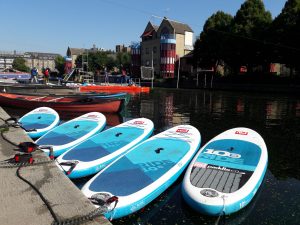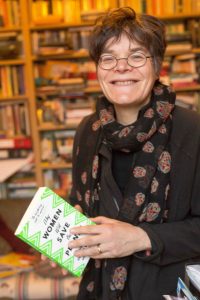Guest blog: Nicola Baird
- July 1, 2020
- Uncategorized
- No Comments
At the Active Travel Academy, we are very much aware that active travel means more than walking and cycling. So we were delighted when Nicola Baird approached us with an offer of a guest blog post, in which she explains the mental-health benefits of horse-riding and paddle-boarding.
How to find your daily dose of happy

Paddleboards at Islington Boat Club (image © Nicola Baird)
It’s 10am and Work From Home (WFH) still rules. Sparrows cheeping is today’s background noise while waiting for a Zoom call at my cluttered desk in urban Finsbury Park. Then a red admiral and cabbage white butterfly circle the roses outside the open window. Senses now on full alert, the tug of my PC screen, and that work meeting, fades. It’s June and I’d like to be outside, ideally in the woods or on the water. The one drawback of WFH, as all freelancers already know, is that without a commute your desk demands attention from the get-go.
Before lockdown I was a portfolio worker mixing journalism with teaching – blogging at University of the Arts’ London College of Communication; horse-riding at Trent Park Equestrian Centre and stand-up paddleboarding from Islington Boat Club in City Road Basin.
Settling straight at my home desk, without a commute, it’s all too obvious that getting to work by porridge-power (or your breakfast of choice) has the potential to energise the rest of the day.
The fitness benefits of active travel are well known. During lockdown my university-attending daughters (one in her final year, the other a first-year) have discovered that taking daily exercise by bike or foot also makes them hungry enough to eat better, and that has given them the motivation to cook. They’ve also realised first-hand how cycling gives the feeling of freedom as you spin towards your destination, and how that is good for your mental health.
As a bonus, walking and cycling need very little kit or cash to enjoy. Ditto scooting, rollerblading and skateboarding. And you don’t have to own things: borrowing is a brilliant way of trying out new ways to get around.
There are even older forms of active travel that also score highly on the wellbeing front and are still just about accessible – riding horses and paddling water from a canoe (or the modern version, a paddleboard), though neither method is high on most commuters’ must-do list. Both also require a certain level of skill and good balance but, once acquired, you can keep doing them well for the rest of your life…
Horses are the original low-carbon method of getting around. In late Victorian Britain there were around 3.3 million horses – around 1,000,000 were working horses getting our stuff and people around. This means that until the rise in car ownership cancelled out the need for actual horse power, most people in the UK worked with, saw, smelt and possibly even touched horses and ponies. They knew what frightened them (anything!), they knew the feel of the milkman’s horse’s soft lips taking a sugar cube and the way a cart horse’s skin wrinkled to twitch off a fly. You could tell them your secrets and, if met often enough, make a friend. It’s only four or five generations ago.
Even now there is something about a horse that makes people want to stand and stare; or get on and try. But horses have never been a press-button gadget with carefully fitting brakes – they require considerable skill, and empathy to ride them well. That’s why a good rider is brave, just like people feel cyclists on non-traffic calmed roads must be. A good equestrian is also adept at anticipating – and avoiding – danger, in just the same way that a cyclist on non-traffic calmed roads must be to stay safe.
In mid-April when lockdown was extended for another three weeks, I cycled slowly to the River Lea and tried to get my head around whether a new normal would encourage the Government and London’s Mayor to bring in ways to help us tackle climate change and go zero carbon. On the Saturday that I should have been out using a paddleboard to pick up litter from the Regent’s Canal with the Plastic Patrol, I cycled up to Tottenham Hale where the Lea is more canal than river. Staring along the water I could see coots already nesting, spot sticklebacks nibbling at the weed and feel fully aware of the Canada geese on their territorial couple patrol. Lost in the moment it took a while before I heard a kindly man asking me if I was OK. He clearly thought I was about to jump. There was no need to worry: intuitively I was deep-diving into a therapeutic nature cure. I was healing, not suicidal.
A 2013 study collecting more than one million responses from 20,000 participants looking at subjective wellbeing concluded that happiness is greater when people are outside in all-green or natural habitats than urban environments (MacKerron and Mourato, 2013). As a city-dweller suddenly stopped from the mind-balm of riding a horse through the oak and hornbeam woods at Trent Park, I needed more from the outside than just to be on a bike getting from A to B. It was Wallace J Nichols who developed the notion of “blue mind” which demonstrated how being on and near water makes our brain produce more serotonin and relax. Perhaps that’s why my daily cycle unthinkingly looped past the East and West reservoir or Regent’s Canal or the Thames. (I’m sure if there had been horses I might have done a different regular route, although I did mortify my 19-year-old when stopping on a cycle-ride to pick up horse poo for my compost bin.)
Many people love the sea and are drawn to it for holidays. But any water, whether showy fountain, modest pond or a big stretch of blue seems to make people feel good. That’s why Nichols dared subtitle his Blue Mind book “How water makes you happier, more connected and better at what you do” (Nichols, 2014). It might also be why last year (pre lockdown) stand-up paddleboarding (SUP) – where you balance on a large floating board – became the world’s fastest-growing sport.
At its simplest, SUP is going for a walk on the water, offering a relaxed full body work out. If it’s done with others it is also a lovely opportunity to chat and sync your movements mindfully to the splash of the paddle dipping in and out of the water. As my colleague at Islington Boat Club, SUP yoga guide Rosie Markwick says: “If you do something that is a little bit on the edge of your physical comfort zone, and is in nature, your mind has this feedback that ‘I didn’t think I was going to be able to do that, what else can I overcome?’ It happens in a small way on Islington in the canal. One thing I notice is the depth of conversations and openness that being on the water seems to inspire. By the time we’ve paddled to Wenlock Basin we are really into good stuff. That’s about seven minutes away from the boat club. It’s not just the conversations I’m having; I hear other people having these deep chats – and I don’t believe they’d normally have that having just met someone so recently.”
Active travel is purposeful: it gets us where we want to be. But, for many people who don’t really want to rush to their desk, the pleasure isn’t just using a safe route outside: there’s also the joy of feeling really free and in charge of the commute, a sort of holiday mode. Those two things mean we may want to walk or cycle the quickest way in the fastest time, but very often we’ll be doing repeat routes on the quiet streets that pass a favourite tree (hello big fig in Amwell Street), or a short detour to admire a front garden or cross a park slowly looking out for a particular squirrel. It’s daft, but that’s our horse rider’s soul kicking in, the one looking out for beauty and danger as they travel.
Nicola Baird has written ten books including the Estate We’re In: who’s driving car culture (Phoenix, 1998) and most recently edited Why Women Will Save the Planet (Zed Books, 2015, 2nd edition). She also specialises in hyper-local journalism – see www.islingtonfacesblog.com
References and links
MacKerron, G., Mourato, S., 2013. Happiness is greater in natural environments. Global Environmental Change 23, 992–1000. https://doi.org/10.1016/j.gloenvcha.2013.03.010
Nichols, W.J., 2014. Blue Mind: How Water Makes You Happier, More Connected and Better at What You Do. Little Brown, London.
To try SUP with Rosie Markwick please go to www.rosiemarkwick.com

- How bold can we be in pursuit of the walkable city? - August 7, 2025
- Register your interest in our course on modifying transport behaviour - November 29, 2021
- New module on modifying transport behaviour - December 15, 2020